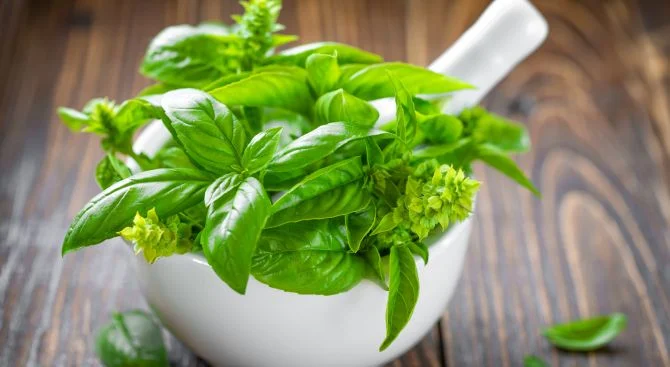Discover the Remarkable Health Benefits of Basil

Basil, scientifically known as Ocimum basilicum, is a versatile herb commonly used in various cuisines worldwide. Beyond its culinary uses, basil offers a plethora of health benefits that can positively impact your well-being. In this article, we will explore the remarkable health benefits of basil.Basil offers various health benefits due to its rich antioxidant and anti-inflammatory properties. It supports digestive health, may reduce stress, and has antimicrobial properties. Basil also contains essential nutrients like vitamins A and K. Its compounds may aid in protecting against chronic diseases and promoting overall well-being.
Health Benefits of Basil

- Protection against Cell Damage: Basil leaves are rich in antioxidants, natural compounds that safeguard our body's cells from oxidative stress. Oxidative stress occurs when there is an imbalance between free radicals and the body's antioxidant defenses. By neutralizing free radicals, basil's antioxidants help prevent cell damage, reducing the risk of chronic conditions such as cancer, cardiovascular disease, cataracts, and arthritis.
- Cancer Prevention: Studies have shown that sweet basil essential oil and leaf extracts from various basil varieties possess anticancer properties. These compounds inhibit the growth and division of cancer cells, potentially contributing to cancer prevention. While further human studies are necessary to confirm these findings and determine optimal consumption levels, basil shows promising potential as a powerful tool in cancer prevention.
- Blood Pressure and Cholesterol Management: Basil, particularly holy basil, has been utilized in traditional Chinese medicine for centuries to treat cardiovascular diseases. Research suggests that basil can effectively lower high blood pressure and improve cholesterol levels. Holy basil contains eugenol, an oil that relaxes blood vessels, contributing to blood pressure reduction. Various forms of basil, including extracts, leaves, and leaf powders, have exhibited positive effects on blood pressure and cholesterol management.
- Blood Sugar Regulation: Both human and laboratory studies have highlighted basil's unique ability to regulate blood sugar levels. Basil extract has demonstrated promising results in reducing blood sugar levels in lab models of diabetes. Additionally, holy basil extract has shown similar effects. While more research is needed to fully understand the impact of different basil varieties on blood sugar health, these preliminary findings suggest that basil could be beneficial for individuals with Type 2 diabetes and those looking to manage blood sugar levels.
- Mental Health Enhancement: Daily consumption of basil has been linked to various mental health benefits. Holy basil, in particular, has been shown to enhance cognitive function, improve mood, and reduce stress and anxiety. Basil essential oils have also displayed potential in decreasing depression and age-related memory loss. While further research is required to fully comprehend basil's impact on mental health, these initial studies indicate its positive influence on multiple aspects of emotional well-being.
Incorporating Basil into a Healthy Diet
To reap the health benefits of basil, it is recommended to include it in your daily diet. You can find fresh or dried basil leaves in most grocery stores, as well as rarer varieties at farmer's markets and ethnic food stores. Dried basil tends to have a stronger flavor, so adjust the quantity accordingly when using it as a substitute for fresh basil. Sweet basil and Italian basil are best used fresh as a garnish, while Thai basil can withstand cooking and higher temperatures.

Cautionary Considerations
If you are considering adding basil to your diet for specific health conditions, it is advisable to consult with your healthcare provider. They can guide you on the appropriate consumption and ensure it does not interact negatively with any medications you may be taking. For instance, combining basil with blood-thinning medications may excessively thin the blood. Additionally, individuals with low blood sugar or blood pressure should monitor their levels when consuming basil alongside medications for these conditions.Too Much Basil Side Effects

While basil is generally safe for consumption, it's important to be aware of potential side effects and risks, especially when consumed in large quantities or used for medicinal purposes. Here are some considerations:
- Allergic Reactions: Some individuals may be allergic to basil or other herbs in the same plant family (Lamiaceae family), such as mint or oregano. Allergic reactions can range from mild symptoms like itching and skin rashes to more severe reactions like difficulty breathing or anaphylaxis. If you have known allergies to herbs or experience any adverse reactions after consuming basil, seek medical attention.
- Interactions with Medications: Basil may interact with certain medications. For example, basil has blood-thinning properties, so individuals taking anticoagulant or antiplatelet medications should exercise caution and consult with their healthcare provider to avoid excessive blood thinning. Additionally, basil may lower blood sugar levels, so individuals with diabetes who are taking medications to regulate blood sugar should monitor their levels closely.
- Pregnancy and Breastfeeding: While culinary use of basil during pregnancy and breastfeeding is generally considered safe, medicinal use or consuming large amounts of basil should be avoided. Limited research exists on the effects of basil in pregnancy and breastfeeding, so it's best to consult with a healthcare provider for personalized advice.
- Medicinal Use: Basil extracts, essential oils, or concentrated forms may have stronger effects and potential risks compared to consuming fresh or dried basil leaves. It's crucial to follow recommended dosages and consult with a healthcare professional before using basil for medicinal purposes.
- Pesticide Residues: Like other herbs and vegetables, basil may contain pesticide residues if not grown organically. Washing fresh basil thoroughly or choosing organic options can reduce the potential exposure to pesticides.
- Digestive Upset: In some cases, consuming large amounts of basil or concentrated forms may cause digestive issues, such as upset stomach, gas, or bloating. Moderation is key when incorporating basil into your diet.
As with any dietary or herbal supplement, it's recommended to consult with a healthcare provider, especially if you have underlying health conditions, are taking medications, or have any concerns or specific dietary needs. They can provide personalized advice based on your individual circumstances and help you make informed decisions regarding the consumption of basil.
Basil Medicinal Uses
Basil has been used for various medicinal purposes throughout history, particularly in traditional medicine systems like Ayurveda and Chinese medicine. While more research is needed to fully understand its potential therapeutic benefits, here are some traditional and current medicinal uses of basil:
- Anti-inflammatory Properties: Basil contains essential oils, such as eugenol, which exhibit anti-inflammatory effects. It has been used to alleviate symptoms of inflammatory conditions like rheumatoid arthritis and inflammatory bowel diseases. However, further scientific studies are required to validate these claims.
- Digestive Aid: Basil has carminative properties, meaning it can help relieve digestive discomfort, such as bloating, gas, and indigestion. It may also support healthy digestion by promoting the secretion of digestive enzymes.
- Respiratory Health: Basil has been traditionally used to address respiratory issues like coughs, colds, and bronchitis. The essential oils in basil, when inhaled or consumed, may help soothe respiratory passages and provide relief from congestion.
- Stress and Anxiety Reduction: Holy basil, also known as tulsi, is highly regarded in Ayurveda for its adaptogenic properties, which help the body cope with stress. It is believed to have a calming effect on the mind and may aid in reducing anxiety and promoting overall well-being.
- Antimicrobial and Antiviral Effects: Basil contains compounds that possess antimicrobial and antiviral properties. While research is ongoing, basil extracts have shown potential in inhibiting the growth of certain bacteria and viruses. However, it's important to note that basil should not be relied upon as the sole treatment for infections, and medical advice should be sought when dealing with serious illnesses.
- Skin Health: Basil has been used topically for its potential benefits to the skin. Due to its antibacterial properties, it may help in managing certain skin conditions, including acne. Basil extracts are also found in some skincare products for their potential antioxidant and anti-aging effects.
It's worth noting that while basil has a long history of traditional use for various ailments, scientific research is still ongoing to determine its efficacy and safety for specific medical conditions. It is always recommended to consult with a healthcare professional before using basil or any herb for medicinal purposes, especially if you have underlying health conditions or are taking medications.
Benefits of Basil Leaves For Skin
Basil leaves offer several benefits for the skin due to their natural compounds and antioxidants. Here are some of the advantages of using basil leaves for skin health:
- Anti-Inflammatory Properties: Basil leaves contain essential oils like eugenol, which have anti-inflammatory properties. Applying basil to the skin can help reduce inflammation, redness, and swelling.
- Acne Treatment: Basil leaves have antimicrobial properties, making them effective in treating acne. They can help kill acne-causing bacteria and reduce breakouts.
- Skin Hydration: Basil leaves contain essential oils that can provide hydration to the skin. This helps in maintaining skin moisture and preventing dryness.
- Skin Radiance: Basil leaves are rich in antioxidants like vitamins A and C, which help protect the skin from free radicals and promote a radiant complexion.
- Fights Signs of Aging: The antioxidants in basil leaves can combat the signs of aging, such as fine lines and wrinkles, by protecting the skin from oxidative stress.
- Reduces Skin Darkening: Basil leaves can help reduce skin pigmentation and dark spots. They may also contribute to a more even skin tone.
- Soothes Irritated Skin: Basil leaves have a calming effect on the skin. They can be used to soothe irritation caused by insect bites, rashes, or sunburn.
- Improves Skin Elasticity: Basil leaves contain compounds that promote collagen production, enhancing skin elasticity and firmness.
To incorporate basil leaves into your skincare routine, you can make basil-infused oil, face masks, or toners. However, it's essential to perform a patch test before using basil leaves on your skin, as some individuals may be sensitive or allergic to them. Always consult with a dermatologist or skincare expert for personalized advice and recommendations.
Bsail Nutrition facts
22 Calories
100 grams
Nutrient Amount(g) DV(%)
Total Fat 0.6 g 0%
Cholesterol 0 mg 0%
Sodium 4 mg 0%
Potassium 295 mg 8%
Total Carbohydrate 2.7 g 0%
Protein 3.2 g 6%
Post a Comment